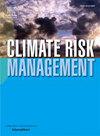Roots of resilience: Revealing social networks for enhancing social resilience in Indigenous Indonesian and Philippine ricescapes
IF 5
2区 环境科学与生态学
Q1 ENVIRONMENTAL SCIENCES
引用次数: 0
Abstract
A complex interplay of social, economic, political, and agricultural factors influences the resilience of Indigenous rice farming communities. This study specifically focuses on the social dimension, examining the crucial role that affective relationships play in fostering social networks that enhance the resilience of Indigenous farmers within the ricescapes of Indonesia and the Philippines. Employing thematic analysis of expert interviews and focus group discussions, complemented by Latent Class Analysis of survey data, we identify the social networks upon which farmers depend. This mixed methods approach enables us to uncover distinct subgroups within these networks that provide support for managing various challenges, assisting with farm tasks, offering financial assistance, and sharing agricultural knowledge. By delineating these subgroups, we advocate for the development of targeted policies that address the unique needs of each group. Recognising and understanding the significance of affective relationships in the formation of social networks is essential for strengthening the resilience of Indigenous farmers, empowering them to navigate contemporary challenges while preserving their cultural heritage.
弹性的根源:揭示社会网络,以提高印尼和菲律宾土著水稻的社会弹性
社会、经济、政治和农业因素的复杂相互作用影响着土著水稻种植社区的复原力。本研究特别关注社会维度,考察了情感关系在促进社会网络中发挥的关键作用,这些社会网络增强了印度尼西亚和菲律宾稻地土著农民的复原力。采用专家访谈和焦点小组讨论的专题分析,辅以调查数据的潜在阶层分析,我们确定了农民所依赖的社会网络。这种混合方法使我们能够在这些网络中发现不同的子群体,这些子群体为管理各种挑战提供支持,协助完成农业任务,提供经济援助和分享农业知识。通过描述这些子群体,我们主张制定有针对性的政策,以解决每个群体的独特需求。认识和理解情感关系在社会网络形成中的重要性,对于增强土著农民的复原力,使他们能够在保护其文化遗产的同时应对当代挑战至关重要。
本文章由计算机程序翻译,如有差异,请以英文原文为准。
求助全文
约1分钟内获得全文
求助全文
来源期刊

Climate Risk Management
Earth and Planetary Sciences-Atmospheric Science
CiteScore
8.20
自引率
4.50%
发文量
76
审稿时长
30 weeks
期刊介绍:
Climate Risk Management publishes original scientific contributions, state-of-the-art reviews and reports of practical experience on the use of knowledge and information regarding the consequences of climate variability and climate change in decision and policy making on climate change responses from the near- to long-term.
The concept of climate risk management refers to activities and methods that are used by individuals, organizations, and institutions to facilitate climate-resilient decision-making. Its objective is to promote sustainable development by maximizing the beneficial impacts of climate change responses and minimizing negative impacts across the full spectrum of geographies and sectors that are potentially affected by the changing climate.
 求助内容:
求助内容: 应助结果提醒方式:
应助结果提醒方式:


